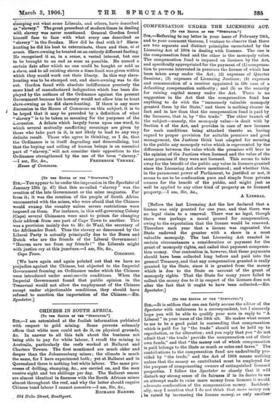COMPENSATION UNDER THE LICENSING ACT. [To THE EDITOR 0/P THE
"srsornms.".1 SIR,—Referring to my letter in your issue of February 24th, and to your comment thereon, I venture to observe that there are two separate and distinct principles enunciated by the Licensing Act of 1904 in dealing with licenses. The one is the compensation fund and the other is the monopoly value. The compensation fund is imposed on licenses by the Act, and specifically appropriated for the payment of (1) compensa- tion to persons interested in premises the license of which has been taken away under the Act ; (2) expenses of Quarter Sessions; (3) expenses of Licensing Justices ; (4) expenses and remuneration of a receiver appointed in tits case of a defaulting compensation authority ; and (5) as the security for raising capital money under the Act. There is no suggestion in the Act that the compensation fund has anything to do with the "immensely valuable monopoly granted them by the State," and there is nothing clearer in fact and in law than that the compensation fund is paid by the licensees, that is, by " the trade." The other branch of the subject—namely, the monopoly value—is dealt with by Section 4 of the Act, and provides in case of new licenses for such conditions being attached thereto as, having regard to proper provision for suitable premises and good management, the Justices think best adapted for securing to the public any monopoly value which is represented by the difference between the value which the premises will bear in the opinion of the Justices when licensed and the value of the same premises if they were not licensed. This seems to take away for the benefit of the public any value in licenses granted since the Licensing Act above mentioned ; and whether this, in the paramount power of Parliament, be justified or not, it seems to me to be confiscation pure and simple from private owners for the benefit of the public, and might just as well be applied to any other kind of property as to licensed property.—I am, Sir, &c., A LIBERAL.
[Before the last Licensing Act the law declared that a license was only granted for one year, and that there was no legal claim to a renewal. There was no legal, though there was perhaps a moral ground for compensation, owing to the expectation that the license would be renewed. Therefore each year that a license was regra,nted the State endowed the grantee with a share in a most valuable monopoly. The last Licensing Act exacted in certain circumstances a consideration or payment for the grant of monopoly rights, and called that payment compensa- tion money. Our contention is, however, that these payments should have been collected long before and paid into the general Treasury, and that any compensation granted is really granted by the State, since it is granted from the money which is due to the State on account of the grant of monopoly rights. That the State for many years failed to collect the money due to it in respect of the licenses does not alter the fact that it ought to have been collected.—ED. Spectator.]














































 Previous page
Previous page